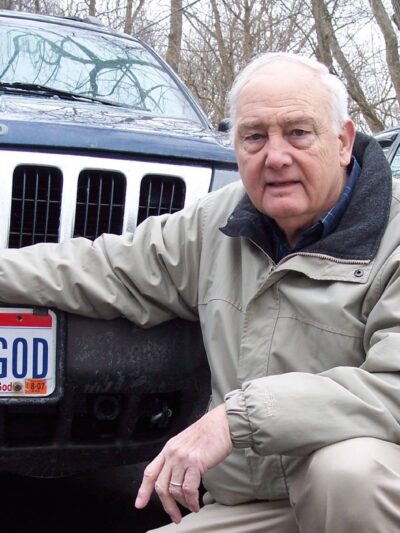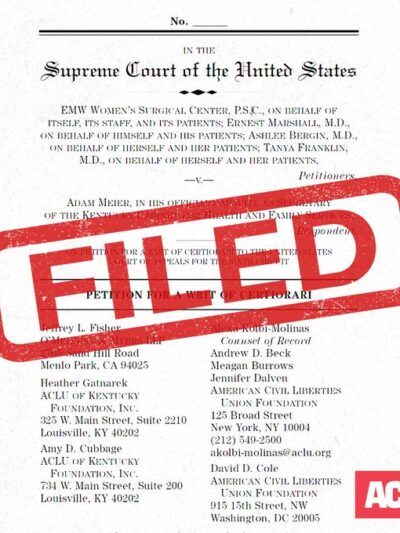News & Commentary
Dec 09, 2019
Supreme Court Declines to Hear Challenge to Unethical Kentucky Abortion Law
WASHINGTON — The Supreme Court announced today it would not review a decision by the Sixth Circuit Court of Appeals upholding Kentucky’s forced narrated ultrasound law against a First Amendment challenge. Today’s ruling allows H.B. 2, Kentucky’s forced, narrated ultrasound law, to take effect. The physicians at Kentucky’s last abortion clinic will be forced to subject every patient to their ultrasound images, a detailed description of those images, and the sounds of the fetal heart tones prior to an abortion — even if the patient objects or is covering their eyes and blocking their ears, and even if the physician believes that doing so will cause harm to the patient. “By refusing to review the Sixth Circuit’s ruling, the Supreme Court has rubber-stamped extreme political interference in the doctor-patient relationship,” said Alexa Kolbi-Molinas, senior staff attorney at the ACLU Reproductive Freedom Project. “This law is not only unconstitutional, but as leading medical experts and ethicists explained, deeply unethical. We are extremely disappointed that the Supreme Court will allow this blatant violation of the First Amendment and fundamental medical ethics to stand.”H.B. 2 has been widely and unequivocally condemned by the medical community, including in friend-of-the-court briefs submitted by the American Medical Association, the American College of Obstetricians and Gynecologists, and the American Public Health Association, as well as by more than 130 leading biomedical ethicists from around the country.

Nov 13, 2019
Victory! Kentucky man wins right to have “IM GOD” license plate
With Freedom From Religion Foundation and ACLU-KY Backing, Kentucky Man Wins Right To Have "IM GOD" License Plate

Nov 04, 2019
2019 Annual Report
The ACLU of Kentucky has seen unprecedented growth over the past year.

Oct 29, 2019
What You Need To Know for Election Day 2019
Make sure you're ready to vote on Election Day, Tuesday, November 5, 2019! Go through the Election Day Checklist below and make sure you are prepared.

Oct 23, 2019
Kentucky Reopens House of Horrors
As Halloween nears, Governor Bevin has made a scary announcement. The private prison facility in Floyd County, once known as Otter Creek, is being reopened in response to overcrowding in county jails across the commonwealth. The facility, owned by Tennessee-based company CoreCivic, will be leased to Kentucky and renamed the “Southeast State Correctional Complex.” This “new” facility will be staffed by state employees, not private prison contractors. Job fairs for the new positions are expected to get underway soon as Floyd County prepares to receive hundreds of inmates in the months ahead. Horrific, overcrowding conditions in Kentucky’s jails have been reported recently by the Herald-Leader, but leasing a private prison is not the solution to the problem.
By Amber Duke

Oct 01, 2019
Versailles Becomes 14th City With Fairness Ordinance
Versailles became the 14th Kentucky town to adopt a fairness ordinance with a vote of 3-2. Versailles has a population of 8,568. LGBTQ residents will now be protected from discrimination in employment, housing, and public accommodations.

Sep 26, 2019
ACLU Asks Supreme Court to Overturn Ruling Upholding Kentucky Forced Narrated Ultrasound Law
The American Civil Liberties Union asked the U.S. Supreme Court to overturn a decision by the Sixth Circuit Court of Appeals upholding Kentucky’s forced narrated ultrasound law against a First Amendment challenge. With the filing of today’s petition for a writ of certiorari, the case becomes the third challenge to an abortion restriction pending before the Supreme Court this term.The law, also known as H.B. 2, requires doctors to force ultrasound images and a detailed description of those images on every patient prior to an abortion—even if the patient objects or is covering their eyes and blocking their ears. Prior to H.B. 2, providers in Kentucky always offered to display and discuss the ultrasound with their patients, but would never force that information on them against their will. Major medical associations — including the American Medical Association, American College of Obstetricians and Gynecologists, and the American Public Health Association — oppose the law because it violates basic ethical and informed consent principles.“This sort of extreme political interference in the doctor-patient relationship has no place in the exam room,” said Alexa Kolbi-Molinas, senior staff attorney with the ACLU Reproductive Freedom Project. “The sole purpose of this law is to shame and coerce someone who has decided to end their pregnancy. It’s time to stop criminalizing health care, interfering with personal decisions, and substituting political agendas for the expertise of health care professionals.”When it was issued this past April, the ruling sparked an impassioned dissent from Sixth Circuit Judge Bernice Bouie Donald, who recognized that “H.B. 2 would require physicians to violate their professional and ethical obligations … [and] that H.B. 2’s one-size-fits-all approach would cause them to harm their patients.” As Judge Donald explained, the majority “decision opens the floodgates to states in this Circuit to manipulate doctor-patient discourse solely for ideological reasons.” She wrote, “The Commonwealth has co-opted physicians’ examining tables, their probing instruments, and their voices in order to espouse a political message, without regard to the health of the patient or the judgment of the physician.” The ruling also conflicts with an earlier decision by the Fourth Circuit Court of Appeals, which struck down an identical North Carolina law because it violated the First Amendment. Unless the Supreme Court resolves this “circuit split,” a doctor’s basic First Amendment rights depend solely on the state in which they practice.The plaintiffs in the case are represented by the ACLU, the ACLU of Kentucky, and the law firm of O’Melveny & Myers.More about this case can be found here: https://www.aclu.org/cases/emw-womens-surgical-center-v-beshear

Sep 26, 2019
Jefferson County Youth Detention Center Closure Opportunity to Reform Juvenile Justice in Louisville
Mayor Greg Fischer recently announced that the Jefferson County Youth Detention Center (JCYC) will close on January 1, 2020. Kentucky’s Department of Juvenile Justice (DJJ) will absorb the young people detained in JCYC or involved in the court system.

Stay Informed
Sign up to be the first to hear about how to take action.
By completing this form, I agree to receive occasional emails per the terms of the ACLU’s privacy statement.
By completing this form, I agree to receive occasional emails per the terms of the ACLU’s privacy statement.
